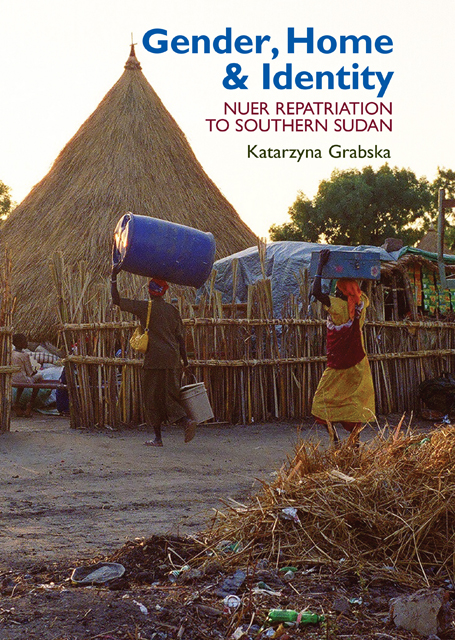Book contents
- Frontmatter
- Contents
- List of Maps and Photographs
- Preface
- Acknowledgements
- Glossary of Nuer Terms
- Acronyms
- 1 Returnee Dilemmas: Dangerous Trousers and Threatening Mini-skirts
- 2 Jiom – Season of Fighting and Running: Conflict, Mobility, Gender
- 3 Mai – Season of Displacement: Becoming ‘Modern’ in Kakuma
- 4 Rwil – Season of ‘Returns’
- 5 Season of Settling-in: Land and Livelihoods
- 6 Tot – Gendered Emplacement Identities, Ideologies and Marriage
- 7 Returnees as Visitors and the Nuer Community: Where Do We Go From Here?
- Epilogue
- Bibliography
- Index
- Eastern African Studies
7 - Returnees as Visitors and the Nuer Community: Where Do We Go From Here?
Published online by Cambridge University Press: 24 February 2023
- Frontmatter
- Contents
- List of Maps and Photographs
- Preface
- Acknowledgements
- Glossary of Nuer Terms
- Acronyms
- 1 Returnee Dilemmas: Dangerous Trousers and Threatening Mini-skirts
- 2 Jiom – Season of Fighting and Running: Conflict, Mobility, Gender
- 3 Mai – Season of Displacement: Becoming ‘Modern’ in Kakuma
- 4 Rwil – Season of ‘Returns’
- 5 Season of Settling-in: Land and Livelihoods
- 6 Tot – Gendered Emplacement Identities, Ideologies and Marriage
- 7 Returnees as Visitors and the Nuer Community: Where Do We Go From Here?
- Epilogue
- Bibliography
- Index
- Eastern African Studies
Summary
Dilemmas About Social Life In Flux
When I left Lϵr in September 2007, Nyakuol, Kuok and Nyariek were partially settled-in. They had found their relatives and had built huts on their land. Nyakuol opened a small shop in the market, established a garden and her children were going to school. In recognition of her strong leadership skills, she was asked to participate in the SPLM political campaign as a representative for Lϵr. Nyariek, still living with her father, was in the process of getting married. Although she had convinced her father to let her complete primary school, she continued to battle against other restrictions imposed on her. She had to stop playing football and was often reprimanded for wearing short skirts. Kuok was working as a teacher and constructing his duël. In 2008, he got married and moved in with his wife. He started teaching his wife reading, writing and English to, as he told me, ‘share knowledge and bring her up’.
Nevertheless, Nyakuol, Nyariek and Kuok felt that their social relations and identities were in flux. They were debating the changing gender norms and relations and found it difficult to conform to their families’ expectations to behave according to the rules of cieng nuära. The nyuuri piny of the displaced populations prompted discussions around the transformations of gender relations among the residents of Lϵr and Bentiu, wider Western Upper Nile and other areas in South Sudan. While this book focuses mainly on Lϵr, and to some extent on Bentiu, the tensions between stayees and returnees presented here shed light on changes and continuities of social and gender relations in the aftermath of civil conflict and the repatriation of the displaced. They also reveal the contestations, dilemmas and uncertainties about social life in flux in the context of community- and nation-building, Lϵr being an example of a social lens for other places in South Sudan.
My research demonstrates that anthropological concepts of emplacement and social change during different phases of conflict and displacement shed light on the personal, communal and structural dynamics of these processes. As Laura Hammond notes, these concepts ‘question the primacy of sedentarist orientations and explore the creation of meaning, identity, and community in the context of flux and disorder [and they] can and should be used to investigate what happens to people who return’.
- Type
- Chapter
- Information
- Gender, Home and IdentityNuer Repatriation to Southern Sudan, pp. 189 - 202Publisher: Boydell & BrewerPrint publication year: 2014



